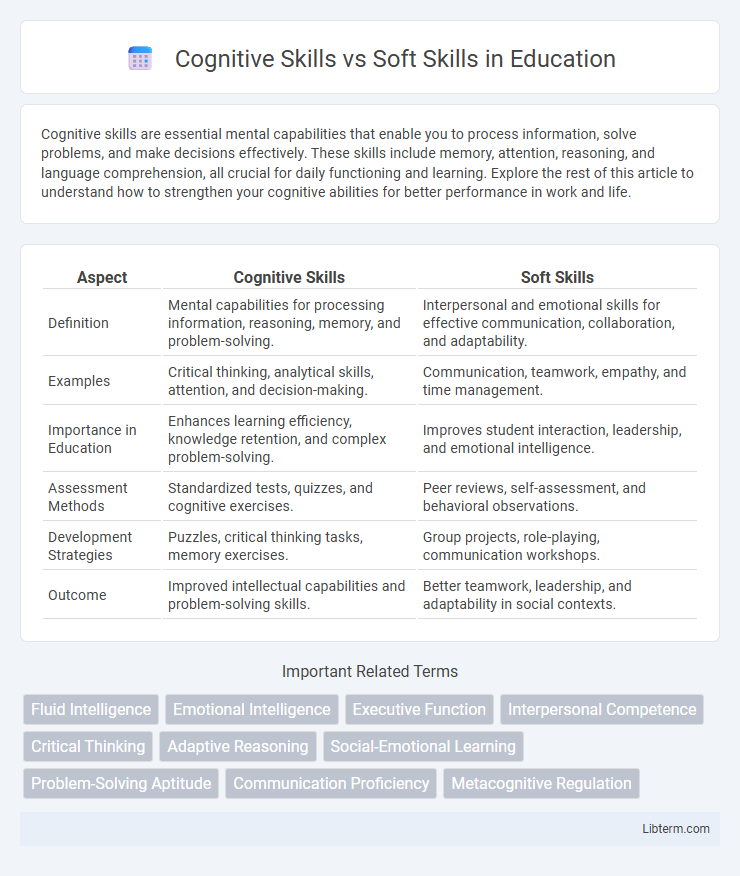Cognitive skills are essential mental capabilities that enable you to process information, solve problems, and make decisions effectively. These skills include memory, attention, reasoning, and language comprehension, all crucial for daily functioning and learning. Explore the rest of this article to understand how to strengthen your cognitive abilities for better performance in work and life.
Table of Comparison
| Aspect | Cognitive Skills | Soft Skills |
|---|---|---|
| Definition | Mental capabilities for processing information, reasoning, memory, and problem-solving. | Interpersonal and emotional skills for effective communication, collaboration, and adaptability. |
| Examples | Critical thinking, analytical skills, attention, and decision-making. | Communication, teamwork, empathy, and time management. |
| Importance in Education | Enhances learning efficiency, knowledge retention, and complex problem-solving. | Improves student interaction, leadership, and emotional intelligence. |
| Assessment Methods | Standardized tests, quizzes, and cognitive exercises. | Peer reviews, self-assessment, and behavioral observations. |
| Development Strategies | Puzzles, critical thinking tasks, memory exercises. | Group projects, role-playing, communication workshops. |
| Outcome | Improved intellectual capabilities and problem-solving skills. | Better teamwork, leadership, and adaptability in social contexts. |
Understanding Cognitive Skills
Cognitive skills encompass mental capabilities such as critical thinking, problem-solving, memory, and attention that enable individuals to process information and learn effectively. These skills are fundamental for reasoning, decision-making, and adapting to new situations, distinguishing them from soft skills like communication and teamwork that focus on interpersonal interactions. Developing strong cognitive skills improves one's ability to analyze complex problems and apply knowledge efficiently across various contexts.
Defining Soft Skills
Soft skills encompass interpersonal abilities such as communication, teamwork, empathy, and adaptability that enable individuals to effectively interact and collaborate with others. Unlike cognitive skills, which involve mental processes like problem-solving and critical thinking, soft skills are rooted in emotional intelligence and social behavior. These skills are crucial for workplace success, leadership, and fostering a positive organizational culture.
Key Differences Between Cognitive and Soft Skills
Cognitive skills refer to mental capabilities such as critical thinking, problem-solving, and memory, which enable individuals to process information and make decisions effectively. Soft skills encompass interpersonal attributes like communication, empathy, and teamwork, crucial for building relationships and collaborating in diverse environments. The key differences lie in cognitive skills being task-oriented and knowledge-based, while soft skills are behavior-oriented and focused on emotional intelligence and social interaction.
Importance of Cognitive Skills in the Workplace
Cognitive skills such as critical thinking, problem-solving, and decision-making are essential for effective workplace performance, enabling employees to analyze complex issues and generate innovative solutions. These skills enhance productivity by improving the ability to process information quickly and adapt to changing environments. Employers increasingly prioritize cognitive abilities because they directly impact strategic planning, efficiency, and overall organizational success.
The Role of Soft Skills in Professional Success
Soft skills, including communication, teamwork, and emotional intelligence, play a pivotal role in professional success by enhancing collaboration and leadership effectiveness across various industries. Employers prioritize these interpersonal skills alongside cognitive abilities such as problem-solving and critical thinking, recognizing their impact on workplace dynamics and productivity. Mastery of soft skills contributes to career advancement by fostering adaptability, conflict resolution, and positive client relationships.
How Cognitive Skills Enhance Problem-Solving
Cognitive skills such as critical thinking, analytical reasoning, and memory directly enhance problem-solving abilities by enabling individuals to process information efficiently and identify effective solutions. These skills facilitate breaking down complex problems into manageable parts, allowing for systematic evaluation and innovative decision-making. Strong cognitive abilities improve adaptability in dynamic environments, ensuring more effective responses to challenges and ambiguity.
Soft Skills for Effective Communication
Soft skills for effective communication include active listening, empathy, and clear articulation, which enhance understanding and collaboration. These interpersonal abilities facilitate conflict resolution, build trust, and foster positive relationships in both personal and professional settings. Developing emotional intelligence is crucial to adapt messaging according to audience needs and improve overall communication effectiveness.
Balancing Cognitive and Soft Skills in Career Development
Balancing cognitive skills such as critical thinking, problem-solving, and analytical abilities with soft skills like communication, emotional intelligence, and teamwork is essential for career development. Employers increasingly value candidates who can integrate technical expertise with interpersonal abilities to adapt to dynamic work environments. Developing both skill sets enhances leadership potential, decision-making quality, and overall professional success in competitive industries.
Strategies to Improve Cognitive and Soft Skills
Developing cognitive skills involves consistent practice in problem-solving, critical thinking, and memory enhancement through activities like puzzles, reading, and mindful meditation. Soft skills, including communication, emotional intelligence, and teamwork, improve through active listening, empathy exercises, and collaborative group tasks. Combining these strategies fosters holistic personal and professional growth, enhancing overall effectiveness and adaptability.
Future Trends in Cognitive and Soft Skills Demand
Future trends indicate a rising demand for advanced cognitive skills such as complex problem-solving, critical thinking, and data analysis driven by AI integration and automation. Simultaneously, soft skills like emotional intelligence, adaptability, and collaboration become increasingly vital in hybrid work environments and globalized teams. The convergence of cognitive and soft skills will define workforce success, emphasizing lifelong learning and digital literacy.
Cognitive Skills Infographic

 libterm.com
libterm.com